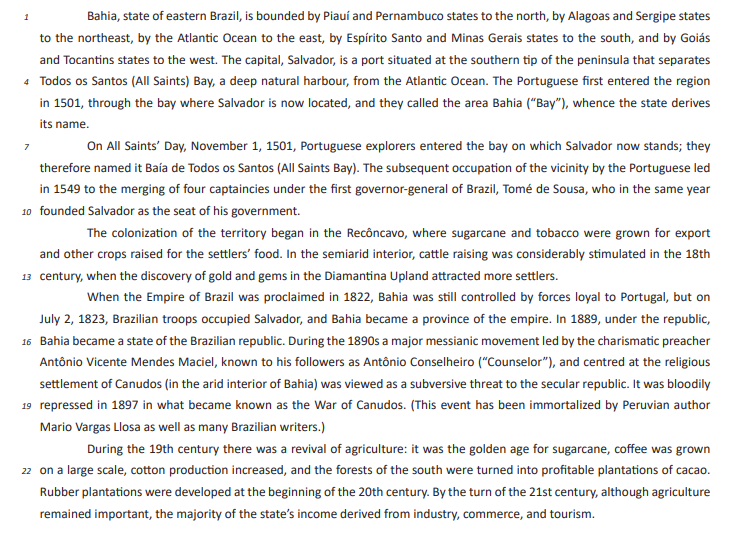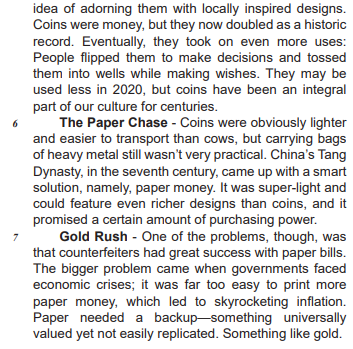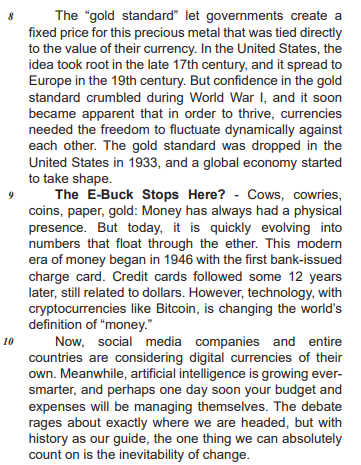Questões de Concurso
Sobre análise sintática | syntax parsing em inglês
Foram encontradas 201 questões

Internet: <www.britannica.com> (with adaptations).
In the construction “whence the state derives its name.” (lines 5 and 6) “whence” means from where and its is a possessive adjective related to “the state”.

Internet: <www.britannica.com> (with adaptations).
The construction “When the Empire of Brazil was proclaimed in 1822, Bahia was still controlled by forces loyal to Portugal” (line 14) can be correctly rewritten as Bahia was still controlled by forces that were loyal to Portugal when, in 1822, the Empire of Brazil was proclaimed.


What is the grammatical function of "me" in the opening sentence of Herman Melville's novel "Moby Dick"?
Text III

Alice Walker (born February 9, 1944), an American novelist, short story writer, poet,
and social activist (https://en.wikipedia.org/wiki/Alice_Walker)
We Alone
We alone can devalue gold
by not caring
if it falls or rises
in the marketplace.
Wherever there is gold
there is a chain, you know,
and if your chain
is gold
so much the worse
for you.
Feathers, shells
and sea-shaped stones
are all as rare.
This could be our revolution:
to love what is plentiful
as much as
what's scarce.
From: https://www.poetrysoup.com/famous/poem/we_alone_23191
Text 2 – Computers
(Text adapted from History of Computing. Retrieved from
https://www.cs.utexas.edu/~mitra/csFall2006/cs 303/lectures/history.html)
When you hear the term computers, it’s difficult to
imagine different devices from a laptop or a small
desktop. Believe it or not, they weren’t always like
they are today. They used to be very large and
heavy, sometimes as big as an entire room. Some
technology professors historically define computers,
as “a device that can help with computations”. The
word computation involves counting, calculating,
adding, subtracting, etc. The modern definition of a
computer is a little wider, because in our day and
age, computers store, compile, analyze and
compute an enormous amount of information.
Ancient computers were very interesting. Actually,
the first computer may have been located in Great
Britain, at Stonehenge. It is a man-made circle of
large stones. Citizens used it to measure the
weather and forecast the change of seasons. Some
specialists say that another ancient computer is the
abacus. It was used by the early Romans, Greeks,
and Egyptians to count and calculate. Even though
they are no longer in use, certainly, these early
devices are fascinating. Computers are embedded
in our history and some people say that we are
completely dependent of them. No matter the
complexity of the task, easy or difficult, some people
can’t do anything without them. Do you contest or
share this opinion?
Read the following exchange between two people having breakfast together.
A – Coffee?
B – Please.
A – Milk? Sugar?
B – No milk. One sugar, thanks.
A – Toast?
B – No thanks.
A – Juice?
B – Mmm.
(Thornbury, 2005, p. 3)
After reading the dialogue, choose the item that DOES NOT describe a correct reflection about grammar.
Considering language and background to language learning and teaching, match the topic to its definition.
( 1 ) Grammar ( 2 ) Lexis ( 3 ) Phonology ( 4 ) Function
( ) is the study of the sound features used in a language to communicate meaning. ( ) is a reason why we communicate. ( ) describes how we combine, organize and change words and parts of words to make meaning. ( ) is individual words or sets of words that have a specific meaning.
Choose the item with the CORRECT sequence.



Available at: https://www.synchronybank.com/blog/brief-history-of-money/. Retrieved on: Sept 10, 2022. Adapted.

Based on the comic strip above, judge the following item.
Although the word “suit” is used as a noun in the first box, it
can also be used as a verb, as in the sentence this color
doesn’t suit you.
Based on the text above, judge the following item.
Considering the necessary adjustments, the expression
‘nature-based solutions’ (in the last paragraph) can be
replaced by solutions developed from nature, without
changing the meaning of the text.
Based on the text above, judge the following item.
In “Children are not being taught enough about plants at a
time when they could be the answer to global warming” (in
the first paragraph), the word “they” replaces “Children”.
Based on the text above, judge the following item.
The sentence “Children are not being taught enough about
plants” (in the first paragraph) can be correctly rewritten as
Children are not receiving enough training on plants
without change in its meaning.
Leia o texto para responder a questão.
English as a Lingua Franca
A number of researchers have studied conversations in English as a Lingua Franca and have noted a number of somewhat surprising characteristics, including:
• Non-use of third person present simple tense -s (She look very sad).
• Interchangeable use of the relative pronouns who and which (a book who, a boy which).
• Omission of articles where they are mandatory in native-speaker English.
• Increasing of redundancy by adding “inexistent” prepositions (We have to study about…, The article treats of…).
• Pluralisation of nouns which are considered uncountable in native-speaker English (informations, staffs).
The evidence suggests that non-native speakers are not conforming to a native English standard. Indeed they seem to get along perfectly well despite the fact that they miss things out and put things in which they ‘should not do’. Not only this, but they are actually better at ‘accommodating’ - that is, negotiating shared meaning through helping each other in a more cooperative way - than, it is suggested, native speakers are when talking to second language speakers (Jenkins 2004). In other words, non-native speakers seem to be better at ELF communication than native speakers are.
(Jeremy Harmer, The practice of English language teaching. Adaptado)
However, we need to think about animals, too ‘…but is now under threat from nature itself.’ ‘Due to exhaustion or stormy weather…’ ‘As a result of all these factors…’
We can infer that the words in bold:
1. They are called discourse markers or linking words, as they help the speaker to manage the conversation and mark when it changes.
2. Discourse markers are words and phrases used in reading to ‘signpost’ discourse.
3. Linking words show us turns, join ideas together, and generally control communication.
4. Discourse markers are referred to more commonly as ‘linking words’ and ‘linking phrases’, or ‘sentence connectors’.
5. They are used more frequently in speech, unless the speech is very formal.
Choose the alternative which contains all the correct affirmatives.